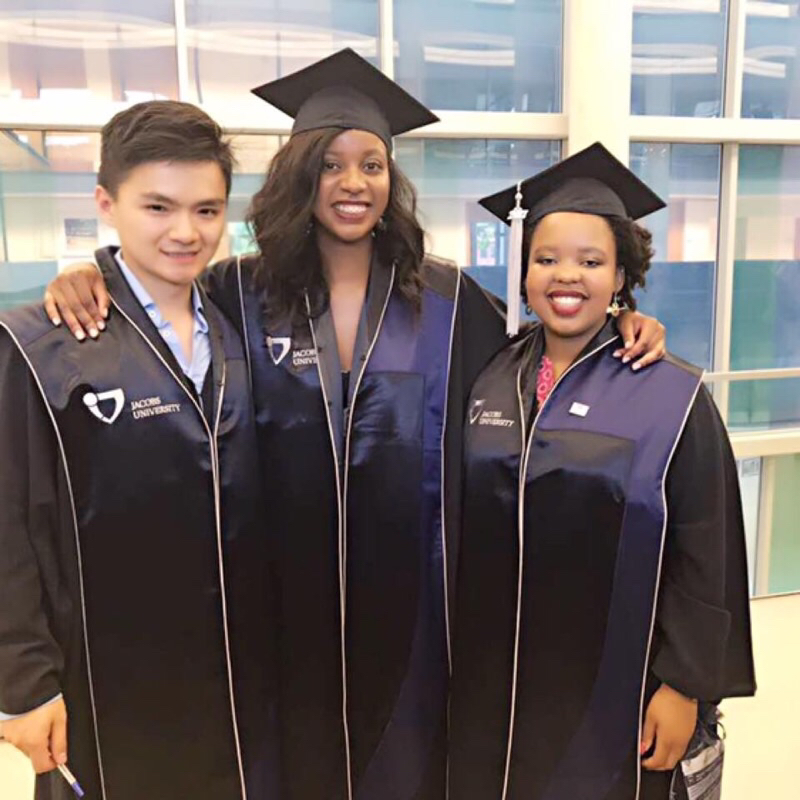On June 11th of this year, one of my best friends Noma from Zimbabwe updated her Facebook profile into the picture below:

Till this day, I can still vividly remember the anxiety I experienced when I had only two weeks left to complete my thesis, and still had to rerun the model with a new set of parameters; the joy I felt, when my family and my friends’ families all came to our Jacobs from different distanced worlds for the first time and maybe for the only time; the sentiment I went through, when my family and my friends said Goodbye to me on the same day, and I had to move to Tuebingen to start my summer internship at Max Planck Institute. Without a doubt, the ups and downs at the graduation season will stay with me for long. Bearing all these emotions, I intent to write down a few most important lessons that I learned from college to let the upcoming college students know what to look out for, and to remind myself of these valuable things which shall not be forgotten in the coming days.
Hard work will be paid off eventually
Going to an American Christian high school in Los Angeles is more likely to make me a better person than a better mathematician or scientist, as the school curriculum will be a lot more focused on one’s spiritual and mental growth than one’s academic Al pursuits, and thus my first year in college was rather challenging for me. When I finally got to compete with people like those who are from Eastern European countries and who have already specialized their areas of studies during high school, I was intimidated. Remember the guy who can almost answer the questions that the teacher raises without much thinking in class? In high school, I was one of those annoying kids but when I started out college, I could no longer be the one of those not because I didn’t want to but because I couldn’t. In a sudden, I felt depressed, pessimistic and less confident.
I had my first mental breakdown already during the first week of college, when I spent the whole weekend trying to finish a recursive proof from the general computer science lecture to no avail. Back in my mind, I already thought about all the alternatives if I couldn’t finish my study program. Maybe I should simply drop out of school or maybe I should switch my major from computer science to something else, however, non of those alternatives made sense to me, so the only way out was to graduate and to keep on doing what I was doing. Fortunately, on the third day, after going through many sample proofs, I was finally able to write down a proof sketch for that homework and it was the time that made me realize that college would be significantly harder than high school if I wanted to do well.
Thankfully when I was struggling and was suffocating myself, I met Noma who was having many similar classes as I did (she studied computer engineering and I studied computer science), and she constantly reminded me of the fact that, “if other people can do it, then we can do it,” and, “since those people are already ahead, and if we want to win the competition in the future, we will have to work harder to make up the gap.” At that time, although we needed to spend a lot more time digesting the course materials, but we told ourselves that we should feel lucky because we were learning more than the other people who had already known the course content. Gradually, we got used to the heavy workload in college and kept on working harder. It might be due that the people who thought they knew everything were slack off in the beginning, and when the professors were teaching the new concepts that they didn’t know, they still tried to persuade themselves that they probably have seen the materials somewhere instead of starting anew like what we did. It was always a beginner’s mindset for us no matter whether or not we thought we knew about something. By the end of college, I could already deal with course load quite easily and achieved excellent marks. Both Noma and I did an exchange semester to enrich our learning experiences. She did hers at University of Pennsylvania and I did mine at Carnegie Mellon University. All of these results didn’t come from how smart we were but because the hard work that we put in. Being smart or having learned something doesn’t imply that one is going to learn more or do better in the future. The future rewards for what you have done and you are going to do but not how SMART you are. There are many studies done that support this claim from cognitive psychology or neuroscience but I will stop here. If you are interested in knowling more, you can read The Talent Code by Daniel Coyle and The Outliers by Malcolm Gladwell who popularized the 1000-hour rule.
Build up your own support network
Many overachievers in high school/college think they don’t need other people’s help in order to get what they want but this perspective probably should change. Confucius once said, “To be established is to help others established, to achieve is to help others achieve.” Having your own network for either social, mental, or academic purposes is a great way for people to help each other out. I have Noma and Thato as my two great companions along the way. They tell me how to not make stupid decisions when I get excited, they comfort my feelings when misfortunates happen, they cheer me up when I encounter hurdles and they support me to the very end when I am determined to do something with good reasons. I don’t know how would I have survived without these two kindest human beings that I know. I am sure that you know many other amazing people around you. Go to talk to them and include them as part of your tribe. Go to parties with them and give them the support that they need and you will get yours when the time comes.
One might say, for feelings, and emotions having a support network is indeed great but a support group might not work for learning purposes. I would argue for the contrary. Learning in a small groups is extremely useful if you know how to cooperate well. I think a study group has become even more important in higher level courses, where only a few people know about the materials and your classmates will be the only ones that you can talk to.
Often when we have some homework sets, we will always do our own problem sets first and than come for a discussions. In college, the grading might not come immediately after you submit the homework so you don’t know if you have misunderstood something, and then you carry the misunderstanding for a few weeks and even when the homework reviews are posted, you overlook your own misunderstanding and therefore you never get corrected. But by learning in a group after each individual has put enough effort of self-learning on his own, the discussion sessions can help to clarify the things that are confusing and are good to think about those abstract concepts from different perspectives. Sometimes when you have a disagreement with someone, it means that either someone is wrong or both of you are wrong and that’s a great learning opportunity that you won’t have by working alone. Lastly, even if you are really good student, explaining things to the others can only strengthen your own understanding because you will need to break down the difficult concepts into coherent and simple languages that anyone can understand. By going through those thought processes, you will gain a lot more about the materials for sure. Even the Nobel laureate Richard Feynman uses this so called Feynman technique to learn almost everything by explaining things to the others.
Make good use of your summer time
Summer breaks give college students another great opportunity to advance our career and explore more places. Many people don’t realize how important their summers are until they start to look for a job and then they realize all positions require prior experiences in project management, software engineering or business development. They then get anxious and confused about how they can get experiences even when the entry level positions require prior experiences. The secret recipe is to do internships over the summer. It is true that many won’t land in their dream work place during their first internship, but that’s completely OK. One can start by working for an OK company during the first summer, then during the second year, because of your experience in the first company, you will be able to land in better places and hopefully you will get into your dream workplace by the time you graduate.
Doing internships is great for a couple of reasons:
- It typically lasts 8-12 weeks, short enough to let you don’t suffer too much if you don’t like the job and long enough to let you get a taste of how it feels like working in certain company.
- You can travel quite a bit at a low cost. You don’t always have to apply to the company of interest in local area. For instance, if want to work for Microsoft, Microsoft has many offices around the world. If you feel adventurous enough, just apply for the positions in Asia or in Europe, and you will be able to travel for free. Sometimes some countries have strict work regulations for foreigners but for an internship sorting out the paperwork shouldn’t be a big issue for major international cooperates.
- For those who want to pursuit a research career, having internships at the labs you want to join is first going to help you find out if you and the lab are a good match and second increase your admission chance. For myself, I spent every single summer doing research at different places in my undergraduate career at my own university, in London and at Max Planck. Although they can seemly be similar on paper, the work environment, the supervision style and the city can change your happiness a lot. Doing several summer research jobs is even more important , if a phd is on your agenda. I am sure that you don’t want to commit 4-6 years of your life living in a place that you won’t be happy and the best way to make sure that doesn’t happen is to do an internship in advance.
Learn to live like a third-culture kid
I’ve come to probably the most important lesson that I learned in my whole college career and that is how to live like a third-culture-kid(TCK). TCKs refer to the group of individuals who have lived in other cultures other than the ones where they were born. I consider myself as a TCK who was fortunate enough to have traveled to so many countries and have studied in China, Germany, the US, the UK and Switzerland thanks for the generous support from my family. The number of people like me is growing as the world is becoming increasingly more globalized. This trend is very easy to see merely by looking the number of international and exchange students out there in different countries (Sorry Britain this doesn’t apply to you until you sort out your own politics). There are lots of benefits of being a TCK such as being able to speak multiple languages, having abundant travel experiences and being able to quickly adapt to a new environment. Indeed those experiences make us more mature and enrich our lives a lot but on the other hand, being a TCK brings many issues that many don’t know how to deal with.
I think the most critical question that TCKs have is where do we actually belong. It is often the case when we move to another country from our homeland, we become nostalgic about the food, the culture and the people back home, nevertheless when we actually return, then we want to leave again because our brain just beautifies everything in our memory and the reality actually has many pitfalls that we seem to have forgotten. What’s more is even after moving out of the home country again, the foreign place doesn’t feel like home either, cultural and/or languages differences. So many people are in this loop of constant moving but don’t feel belong to anywhere at all. To me, I look at this issue by thinking slightly differently, that I do recognize that there is this physical home, Guiyang, China where I grew up and call home, even though I don’t really think I belong there and there is this home that’s always on the way, this home where other TCKs gather and can understand each other. It doesn’t have to be something concrete that one can touch but more of a concept that wherever we are, wherever is home.
I can keep talking about TCK for pages, but really I just want to raise people’s awareness of the existence of this group of people who are becoming more prevalent nowadays. Note that although many people might have not lived in different countries for an extended amount of time, but also feel the same like there is a huge difference between the culture in a small village in Texas than the culture in New York, we call this group of people trans-culture-kids (TRCKs) which more or less share similar feelings and issues as the TCKs. To find out more about TCKs, David Pollock’s Third Culture Kids: Growing Up Among Worlds can be a fascinating read. He talks about the benefits and challenges of being a TCK and some solution to counteract the major hurdles.
There is one more thing that I’d like to address before moving to the next section is that TCKs are just like any other kid at the same time. It is common for TCKs to have a sense of superiority because of their colorful life experiences and they would tend to think other people as boring as they probably have just been living in the same city for their entire life. The truth is we can learn something from everyone. An ancient Greek wise man once said that, there is no one so that stupid that he can learn nothing from, and Confucius also has said, “When I walk along with two others, they may serve as my teachers.” So we shouldn’t be too proud of our privilege, should we?
Remember to have fun
Lastly, you should learn to enjoy the process as much as you can. We aren’t robots, and we have feelings. Indeed hard work pays well but we can’t be constantly living under stress. Our will power is limited, if you have to endure the boredom you experience doing things you don’t like, how do you have the will power to do the things that are more important? Eventually you are going to burn out. So really, remember to do the things you really enjoy doing and go for the opportunies you really like. Many people are concerned about losing faces or don’t dare. To be honest in 15 years, probably no one is going to remember that stupid question you asked in class or that awkward date you had with the person you had a crush on. But we, ourselves are going to regret more for the things that we didn’t do than the ones that we actually did.
Again let me summarize what I found important in my college time:
- Hard work will be paid off eventually.
- Build up your own support network
- Make good use of your summer time
- Learn to live like a third-culture kid
- Remember to have fun

What’s next at EPFL
I really hope that you enjoyed reading this post and if you have experienced anything common in your college life. Please feel free to comment below, I’d love to know the life lessons you learned in college and if other people experienced similar issues as I did. So that was the end of my undergrad career and I am already at EPFL doing the intensive French course before all the courses start. Till this day, I have been enjoying the wonderful weather and the beautiful lakes. EPFL even has a really good Chinese restaurant on Campus. What can I complain!?s I feel really excited to embark my next journey at EPFL and also my lab assistantship at professor Courtine’s lab on spinal cord. Keep in touch and more is to come :D
